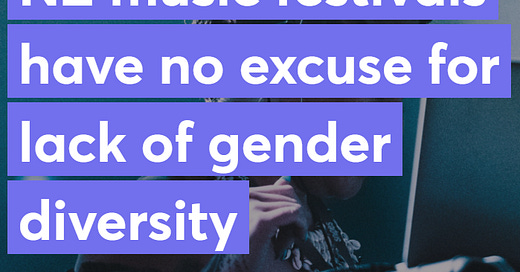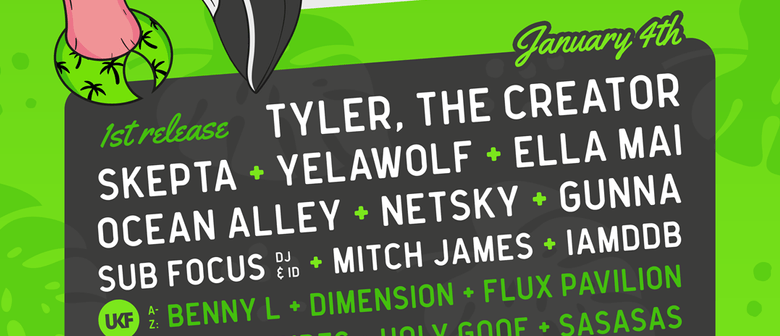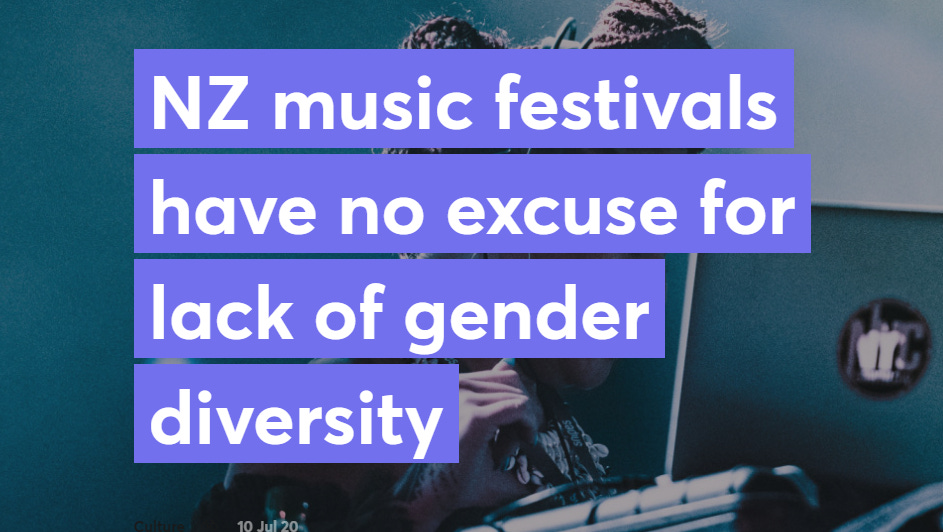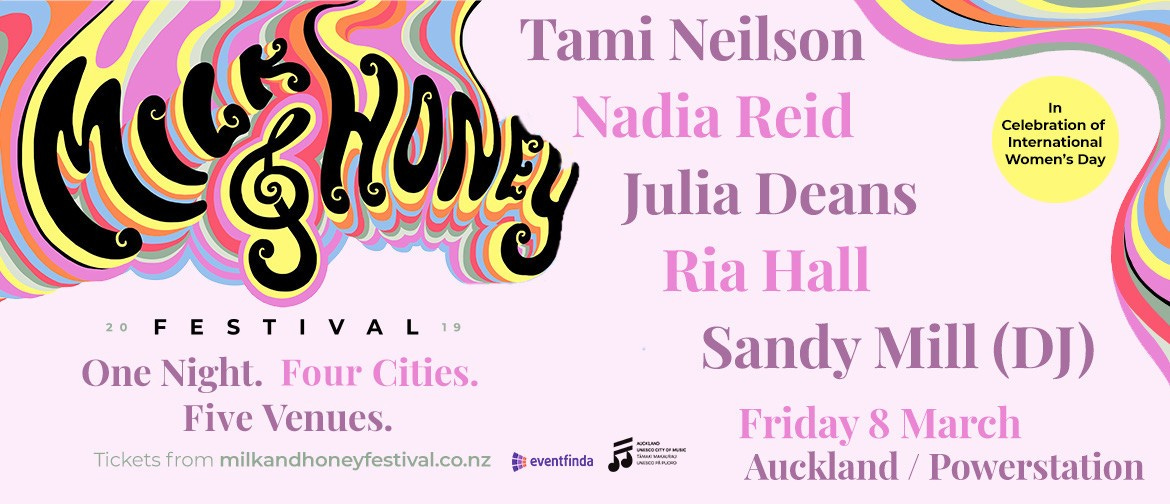Are our festival line-ups diverse enough?
Three years ago, a local journalist wrote the definitive story on this topic. I asked her if anything has changed.
No.
The answer’s a resounding, “No.”
Of course the answer’s no.
Look at these posters and tell me the answer to the question, “Are our festival line-ups diverse enough?” is anything other than a big fat resounding, “Hell no”.
Clearly we have a problem.
In 2023, if you’re announcing a music festival line-up loaded with local and international acts and the top four decks of your poster barely features a female artist, something’s gone very wrong.
Our upcoming summer season is stacked beyond belief. There are 80 music festivals happening over the next five months – I counted them all, it took me forever, and I’m still finding more – and they have just a handful of female headliners between them.
I barely need one hand to count them. Benee is at Rhythm & Alps. Peggy Gou and Becky Hill are at Golden Lights. Rhythm & Vines has Gin Wigmore. Laneway has Suki Waterhouse and Raye. Splore has Estere. Rolling Meadows has The Veronicas.
And then there’s … umm … ahh … erm …
When Kelis dropped out of Bay Dreams, I could have cried. She was the stand out, the single, big-name, female headliner ranked higher on a festival bill than most men.
That’s a travesty. But you don’t need me, another middle-aged man, to tell you this.
That’s why I called Maggie Shui.
Three years ago, she wrote what I consider to be the definitive story on gender diversity at local music festivals.
For that piece, she interviewed promoters, industry representatives, artists and more to paint a picture of a festival landscape dominated by – surprise, surprise – men.
What she found was pretty bleak.
Here’s Imugi’s Yery Cho:
“Maybe it's a boys’ club thing … you see groups of men who love hyping each other up. Whenever they’ve got any opportunity or paid gigs, they will just work with the same group of white men.”
Here’s Lady Shaka, who has played at Glastonbury and Filth:
“When I tried to reach out to festivals in New Zealand there was almost little to no response which is sad when you know you have so much to offer.”
Maggie’s just moved to the UK, so she was nice enough to stay up late – while suffering through a cold, I might add – so I could ask her if she thought things were any better three years on from writing that story.
Her answer was a resounding “no”.
'Nothing really seems to change'
It was 2020. Because of Covid, New Zealand’s borders were closed. International artists couldn’t come into the country. Only local artists could play shows.
If there was ever a time to address the issue of gender diversity at music festival line-ups, this seemed to be it.
“There was a sense of possibility,” says Maggie Shui. “It was an opportunity to be more active about who we platform and who we choose to put on our line-ups.”
Shui says this moment seemed like a better time than any to rethink what a festival line-up can and should do.
She and her friends couldn’t stop talking about it. They loved music and wanted to attend festivals, but kept getting presented with line-ups like this…
It’s why she chose to write a story about it. “I listen to a majority of women artists on a day-to-day basis,” she says. “I have a lot of friends who have similar tastes in music to me … It was a conversation that just keeps cropping up.
“We're always adapting ourselves a little bit. Having to … go to festivals that maybe the headliners aren't really what we're into. But we make do with the people that are 10 lines below the headliners on the poster.
“You think, ‘Where are the festivals that are just for us?’”
So Shui decided to try and do something about it.
Working for the website Re:, she spent weeks interviewing those in and around the music industry to figure out why line-ups become so inevitably male-heavy.
The result was this scathing piece that threw a pitchfork into the heart of New Zealand’s festival landscape…
“It's always the same people headlining local festivals,” says Shui.
She’s got a point.
This summer, you have six opportunities to see Sublime with Rome (all dudes) play. You have seven chances to see The Grogans (all dudes) play. And you have nine places you can go see Coterie (all dudes) perform live.
Wilkinson, Netsky and Sub Focus (all dudes) feature heavily on local festival line-ups.
“It's a self-fulfilling prophecy,” says Shui. “They put up the same people on their line-ups and they attract a crowd who like those artists. So then they keep on having artists like that.
“If you had Carly Rae Jepsen headline Bay Dreams you'd have [a bad] reaction because people are conditioned to see Peking Duk.”
Many promoters say it’s a pipeline problem. That there aren’t enough female artists on the touring circuit at any one time. That speaks to a far larger issue, one where we need to ask if there’s enough gender diversity at our radio stations and record labels.
But Shui believes there’s a market for festivals full of non-male artists, and says her story showed that artists like Lady Shaka are there, willing and able to play those shows.
“The onus is on people who have that decision-making power to try a little bit harder to find them and to book them,” she says. “Maybe we just need another music festival or something.”
To be honest, I felt bad calling Shui up to chat about this. I would have rather called her to say everything’s great, we have plenty of diversity and look how much has changed since she wrote her story.
But it hasn’t. Three years on, things appear to be worse.
“You'd like to think that even if it's slow, there's always a little bit of progress … in the grand scheme of things,” says Shui.
“It seems like it's just plateaued … It's sad.”
I couldn’t end on a downer. There has to be an answer to this. There is.
Shui’s piece points to the festival Milk & Honey, a nationwide, one-day event held in 2019. With 20 non-male artists on the bill, it sold out.
It can work. It does work. Shui’s big idea for change isn’t groundbreaking, it’s just something that needs to be done more often.
If we have 80 festivals taking place over the next five months, surely there’s room for one more?
Thanks for reading today’s free edition of Boiler Room. If you liked this, and the other stories I’ve been writing here, please consider upgrading your subscription so I can do lots more like them. (If you’re already doing this, you’re super awesome!)










Just a small NB: It's been pointed out to me that Splore's 2021 line-up was predominantly women, and every main stage act featured a non-male artist. Further proof that it can (and should) be done.